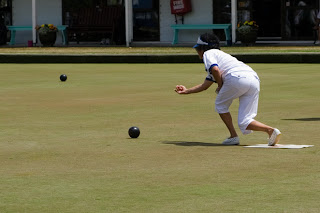
"Come on in," a white-clad figure with broad-brimmed hat calls out. He has seen me with my camera looking on from outside the low fence.
Imagine a giant billiard table 37 or 38 metres square, at ground level and in the open air. Replace the green cloth with equally green, incredibly fine, close-clipped grass and you have the setting for lawn bowls.
The Taupo Lawn Bowling Club has three such greens. Only one is in use, but there is a row of men and women at either end of it, mostly of mature years and all dressed in spotless white. I enter and am beckoned closer.
"I can explain the game," the man says, automatically assuming I know nothing about it. I stand separated from him and his opponent, a woman, by the shallow ‘ditch’ surrounding the green, which is divided into six strips, playing areas called ‘rinks’. Their partners are at the opposite end.
Six matches are in progress. This is a club tournament for pairs, I learn between bowls. Each team can consist of two men, two women, or one man and one woman. I am concerned that my presence may put my informant off his game, but when he explains the scoreboard to me I can see that he and his partner are far, far in the lead. His lady opponent remains silent.
On the way south to Wellington, I spent several days in Taupo on the volcanic central plateau of the North Island, by the shores of Australasia’s largest lake, of the same name. Look across the blue-green water on a clear summer day and standing out in the distance is the snow-capped peak of the island’s highest mountain, Ruapehu (which also has the best ski slopes), together with its slightly shorter and slimmer neighbour, Tongoriro. A third mount in the Tongoriro National Park, Ngauruhoe, shares with Ruapehu the distinction of being the only active volcanoes on the New Zealand mainland.

The lake covers several former craters. The country’s longest river, The Waikato, enters to the south and leaves from the opposite shore, flowing north-west to the Tasman Sea. There are several power stations along it and you can soon see why. Follow its winding course for some kilometres — and there’s a good, though undulating, walking track from the outskirts of town, past where the bungy jumpers plummet screaming from a height towards, or into, the water — and the river suddenly narrows very sharply. The water now froths and fumes as it is forced through the gorge at great speed until hurtling over the not-so-steep Huka Falls.
Back at the bowling club, other players say hello and offer snippets of information between spells of less hectic activity. The jack must be rolled at least 23 metres I’m told, and the bowls are not weighted as I had previously believed, but can be made to swing in from either direction solely because they are flattened on one side.
I am now sitting on a bench outside the large club house. The lady opponent of my original informant suddenly appears and offers me a cup of tea inside, where large windows reveal impressive views across the lake. "That’s very kind of you," I say. She stays only briefly, however, before returning to her game.
When I go back to check on its progress I see that she and her partner have made up their huge deficit and to judge by the way she is bowling, will soon be in the lead, while the gentleman beside her has clearly lost the sure touch he had earlier. I comment on the change of fortune.
"It’s because I was kind to you," she says. And smiles broadly.

No comments:
Post a Comment